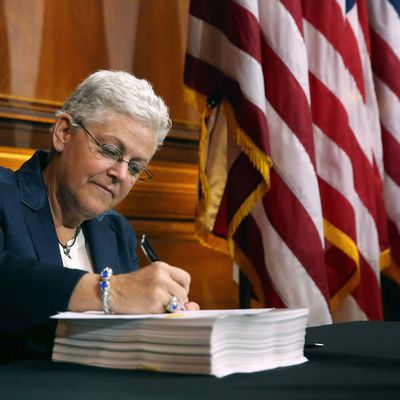
Republicans have attempted to seize upon a great many scandal allegations against the Obama administration, but the most surreal may be their accusation that the administration’s climate agenda has been improperly influenced by environmentalists. Republicans are launching investigations in both the House and the Senate to expose the hidden hand of environmentalists in the crafting of environmental regulations. “The E.P.A. appears to have a far cozier relationship with N.R.D.C. lobbyists on carbon emission rule-making than with any other stakeholders,” charges Darrell Issa, chairman of the House Oversight and Government Reform Committee. “The N.R.D.C.’s influence on draft E.P.A. regulations raises substantial concerns about blurred lines and inappropriate influence.”
The facts at the heart of the charge are not really in question. The NRDC truly did work closely with the administration to develop its power plant regulations, and its proposal for a flexible, state-by-state regulatory scheme seems to have furnished the basis for Obama’s own plan. Why is this scandalous? Zero in on the key terms in Issa’s statement: “far cozier” and “inappropriate.”
Congressional Republicans are not charging that the administration did anything illegal. They are merely claiming that it was “inappropriate.” Perhaps it would be inappropriate for the administration to completely outsource its decision-making process to an advocacy group, but they are not charging that this took place. The administration’s proposal resembles but is far from identical to the NRDC’s plan. The accusation — “far cozier” — merely charges that the administration worked more closely with the NRDC than with, say, lobbyists for oil and coal.
That is true, and the mere fact that it has become the subject of controversy exposes an import underlying fact about modern American politics. The Obama administration solicited feedback from industry as well as from environmental experts, and crafted a compromise plan designed to meet the administration’s emissions goals at the lowest possible cost while carrying out its legal mandate to regulate carbon.
It may not be a perfect plan, but it is surely a pluralistic one. Pluralism is an old-fashioned political science concept that described policies that incorporate compromises between competing interest groups. It was an attempt to describe the sort of policies generally produced in the postwar American political scene, when labor and business were able to forge some rough accord. In modern American politics, it describes policies within the Democratic Party, which draws support from business as well as labor, environmentalists, and consumer groups. The Republican Party’s economic coalition, by contrast, has a monolithic pro-business cast. Under the Bush administration, environmental policymaking was designed with input from business, especially the fossil fuel industry, with no significant input from environmentalists whatsoever. (Likewise, organized labor has no influence among Republicans at all to match the significant influence wielded by business upon Democrats.) Here is a utility spokesman praising the Obama administration’s willingness to listen to its perspective:
“If we ask for a call or a meeting, they’re receptive,” said John McManus, vice president of American Electric Power, an electric utility that operates in 11 states. “They do want to hear what industry thinks of this, what states think. E.P.A. got input from a lot of groups.”
Environmentalists would not say anything like this about the Bush administration or Republicans in Congress. This is one of the most important asymmetries in modern American politics. Within the Republican Party, it has come to seem normal for environmental regulations to be crafted entirely along the lines demanded by business lobbyists. The existence of a significant lobbying role for environmentalists — even the moderate, well-respected ones at the NRDC — seems to them scandalous.






























